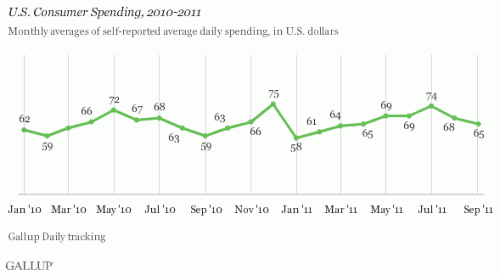 Consumer spending moved down fairly sharply in September. It is not just a sign of slowing. If a new Gallup tracking poll is right, improvements in consumer activity that occurred in late 2010 are gone.
Consumer spending moved down fairly sharply in September. It is not just a sign of slowing. If a new Gallup tracking poll is right, improvements in consumer activity that occurred in late 2010 are gone.
“Overall self-reported daily U.S. consumer spending in stores, restaurants, gas stations and online averaged $65 per day in September, down from $68 in August and from the 2011 high of $74 in July. After two months of declines, spending has now returned to March and April levels, which are some of the lowest of the year,” Gallup reports.
The news would not be good under any circumstances, but the data is for a month that immediately precedes the holiday shopping period. Any U.S. GDP expansion counts on strong retail activity from October through December. That strength looks less likely by the day. Whatever stimulus might come from the debate over the Obama jobs bill will have no effect until well into 2012. In other words, the chance to make the fourth quarter better economically is already lost. Investing in infrastructure creation and repair and extending a tax credit may help, but not until into next spring, if at all.
GDP contraction has begun, based on a growing body of data. And any catalyst to change that in the next six months has become less and less likely to appear.
Methodology: For Gallup Daily tracking, Gallup interviews approximately 1,000 national adults, aged 18 and older, each day. The consumer spending results are based on a random sample of approximately 500 current full-time and part-time employees each day.
Douglas A. McIntyre
Essential Tips for Investing: Sponsored
A financial advisor can help you understand the advantages and disadvantages of investment properties. Finding a qualified financial advisor doesn’t have to be hard. SmartAsset’s free tool matches you with up to three financial advisors who serve your area, and you can interview your advisor matches at no cost to decide which one is right for you. If you’re ready to find an advisor who can help you achieve your financial goals, get started now.
Investing in real estate can diversify your portfolio. But expanding your horizons may add additional costs. If you’re an investor looking to minimize expenses, consider checking out online brokerages. They often offer low investment fees, helping you maximize your profit.
Thank you for reading! Have some feedback for us?
Contact the 24/7 Wall St. editorial team.



